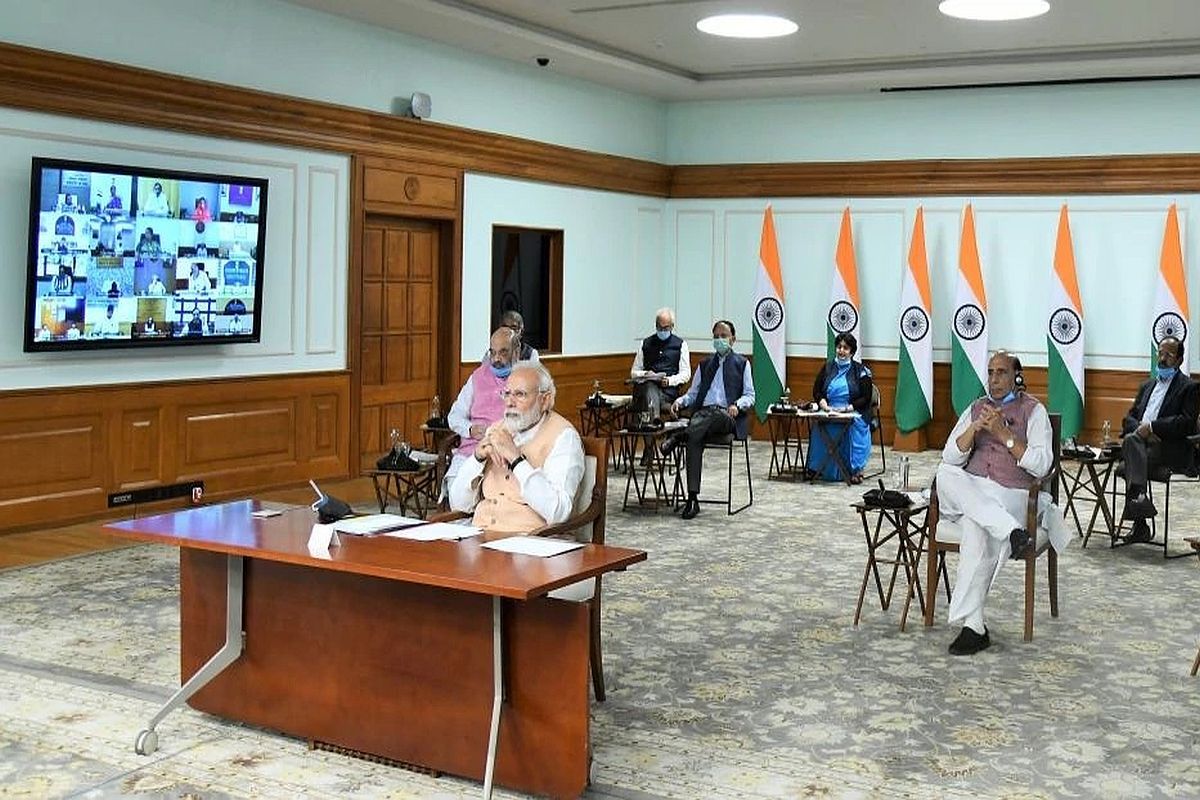Congress committing dacoity on rights of OBCs, SCs, STs: PM
“Wherever it (Congress) can do it, it will try to loot the claims of the SCs, STs and OBCs and give them to others,” said Modi.
Presidents of various political parties would take part in this virtual meeting, the Prime Minister’s office has informed.

Prime Minister Narendra Modi addressing a virtual conference. (File Photo: narendramodi.in)
Amid escalated tensions between India and China following violent clashes between the troops of both sides at Galwan Valley in eastern Ladakh, Prime Minister Narendra Modi has called for an all-party meeting at 5 pm on Friday to discuss the situation at the border.
Presidents of various political parties would take part in this virtual meeting, the Prime Minister’s office has informed.
In order to discuss the situation in the India-China border areas, Prime Minister @narendramodi has called for an all-party meeting at 5 PM on 19th June. Presidents of various political parties would take part in this virtual meeting.
Advertisement
— PMO India (@PMOIndia) June 17, 2020
The call for an all-party meeting comes hours after Congress leader Rahul Gandhi hit out at the Centre asking why Prime Minister Narendra Modi was “silent” on the killing of Indian soldiers.
“Why is the PM silent? Why is he hiding? Enough is enough. We need to know what has happened. How dare China kill our soldiers? How dare they take our land?” the former Congress president tweeted.
The Congress had also demanded that PM Modi should address the nation and call an all party meeting to discuss the situation.
An unprecedented violent clash took place in Galwan Valley at the Line of Actual Control with Chinese People’s Liberation Army soldiers attacking a small group of Indian Army men on patrol, resulting in fatalities which included the commanding officer of the Indian Army.
The intensity of the fight increased with reinforcements from the both sides and it continued until late night till the time they got exhausted. Many Indian soldiers went missing during the fight. Early on Tuesday morning, both Indian and Chinese top military officials rushed and called for a meeting to defuse the situation.
As many as 20 Indian Armymen including officers were killed in the face-off while the the Chinese side is learnt to have suffered over 40 casualties including dead and seriously injured.
Meanwhile, Indian and Chinese troops have disengaged at Galwan area where they had earlier clashed.
India has hit out at China for “unilaterally” attempting to change the status quo along the Line of Actual Control (LAC) in Eastern Ladakh, which led to the killings of troops of both the countries in a violent clash on Monday night.
The Ministry of External Affairs’ official spokesperson Anurag Srivastava said that on Monday late-evening, a violent face-off erupted between the two sides because of “an attempt by the Chinese side to unilaterally change the status quo” in the Galwan Valley in Ladakh.
“Both sides suffered casualties that could have been avoided had the agreement at the higher level been scrupulously followed by the Chinese side,” Srivastava said.
This serious escalation between the two countries along the border is happening almost after five decades.
These are the first casualties faced by the Indian Army in clash with the People’s Liberation Army since 1975 when an Indian patrol was ambushed by Chinese troops in Arunachal Pradesh.
Union Defence Minister Rajnath Singh had briefed Prime Minister Narendra Modi about the prevailing situation in Ladakh on Tuesday.
The violent face-off comes even as de-escalation talks have been going on ground in eastern Ladakh since the past few weeks through military and diplomatic channels.
On Monday, Brigade Commander and company level talks happened in Eastern Ladakh between India and China. The talks were happening near patrolling point 14 near the mouth of Galwan Valley and patrolling point 17 in the Hot Springs area.
Senior Commanders had a productive meeting on June 6 and agreed on a process for such de-escalation. Subsequently, ground commanders had a series of meetings to implement the consensus reached at the higher level.
Meanwhile, the United States and the UN have expressed concerns over the reports of violence and deaths at the Line of Actual Control (LAC) between India and China and voiced hope that the two countries will peacefully resolve differences.
Advertisement